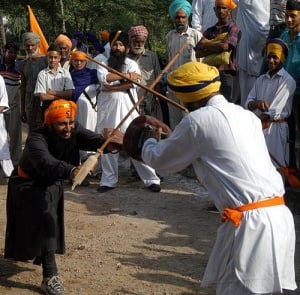Hola Mahalla
Hola Mohalla or simply Hola is a Sikh festival that takes place on the first of the lunar month of Chet which usually falls in March. The word Hola Mohalla stands for "mock fight". During this festivals, procession are organised in the form of army column accompanied by war-drums and standard-bearers and proceeding to a given spot or moving in state from one gurdwara to another. The custom originated in the time of Guru Gobind Singh who held first such mock fight at Anandpur in February 1701.
This annual festival held at Anandpur Sahib in Punjab and other Gurdwaras worldwide was started by the tenth Sikh Guru, as a gathering of Sikhs for military exercises and mock battles on the day following the festival of Holi. It reminds the people of valour and defence preparedness, concepts dear to the Tenth Guru who was at that time battling the Mughal empire.
On this three-day grand festival mock battles are held followed by kirtan, music and poetry competitions. They perform daring feats, such as Gatka (mock encounters), tent pegging, bareback horse-riding, standing erect on two speeding horses and various other feats of bravery.
There are also a number of Darbars where Sri Guru Granth Sahib is present and kirtan and religious lectures take place. On the last day a long procession, led by Panj Pyaras, starts from Takhat Keshgarh Sahib, one of the five Sikh religious seats, and passes through various important Gurdwaras like Qila Anandgarh, Lohgarh Sahib, Mata Jitoji and terminates at the Takhat.
For people visiting Anandpur Sahib, langars (voluntary community kitchens) are organized by the local people as a part of sewa (community service). Raw materials like wheat flour, rice, vegetables, milk and sugar are provided by the villagers living nearby. Women volunteer to cook and others take part in cleaning utensils and other manual tasks that need to be carried out. Traditional cuisine is served to the pilgrims who eat while sitting in rows on the ground. (Pangat)

